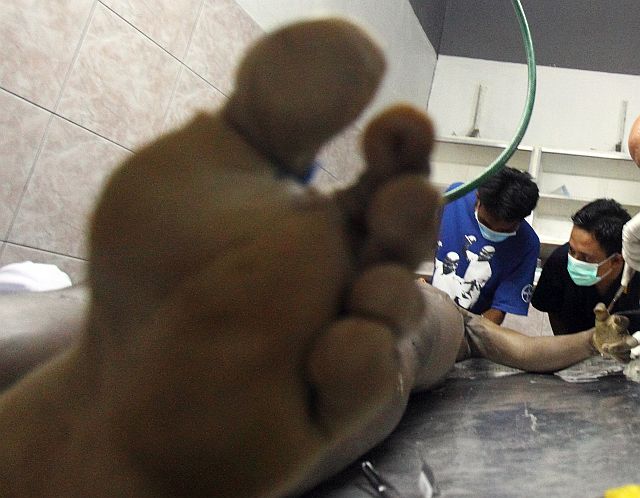
The body of a drug suspect killed in a police operation is being taken care of at the funeral parlor.
CONCLUSION
As the body count in the war on illegal drugs rises, funeral parlor staff members see no profit in servicing the bodies of people killed in shootouts with police officers.
They also could not touch the cadavers until a death certificate from the health office and the medico legal doctors would be produced.
Burial Assistance
Enrique Lapetaje, billing and collection supervisor of St. Francis Memorial Homes, said at least three drug-related deaths were referred to the funeral home from July 1 to July 20.
Without having to give specifics in respect of their clients’ privacy, Lapetaje said families of the three still had unpaid balances with them.
“If they cannot pay the full amount and the body was already buried, then we will request them to sign a promissory note, which in turn will give them at most six months to settle their accounts once and for all,” he said.
If their clients still could not settle their accounts within that time, then another promissory note with the same policies would be issued.
However, Lapetaje said their company would consider their accounts as fully paid if they would still be unable to pay the remaining amount.
“But we only do this kind of consideration to families who have unpaid balances amounting to no more than P3,000, and grantees of the city government’s burial assistance program,” he clarified.
Aside from a photocopied document of the death certificate, relatives seeking burial assistance from the Cebu City government will still have to obtain a certificate from a barangay official — endorsed by at least one city councilor — to prove that their current socioeconomic status is thoroughly assessed, and therefore qualified to apply.
Once qualified, they will proceed to fill up the application forms from the city’s Department of Social Welfare Services (DSWS).
If the DSWS approves their request, then it will be up to the city government to deal and transact with the funeral parlors.
“The money from the city government will be directed to our company, which will cover the embalming fees and the manufacturing of the coffins,” said Lapetaje.
Families of the three dead victims, whose bodies were taken care of at St. Francis Memorial Homes, availed of the city’s burial assistance to settle their funeral parlor bills.
The city government allocates cash assistance of P10,000 under its Pauper’s Burial Assistance Program to take care of the funeral bills of the slain victims.
However, the amount will only cover embalming and the casket cost.
In most cases, Lapetaje said, the city’s assistance is just enough to cover for the casket cost; thus, leaving behind an unpaid balance.
Funeral services always come in packages. The package consists of embalming, coffin and funeral rites held in their chapels.
Coffins
With their cash limitation, poor families would often pick their all-white coffins that cost P10,000 to P12,000 each.
These kinds are brush-up coffins made from plywood with thick planks installed to support its edges.
But unlike the more expensive kinds, these do not have handles on both sides.
Mandaue City
But while processing of burial assistance is easier in Cebu City, families of the deceased in Mandaue City had to run to the Department of Social Welfare and Development Central Visayas (DWSD-7) for help.
Processing of DSWD assistance would often take five days to several weeks. Applicants are required to pass a photocopied death certificate of the deceased, and an endorsement letter from either a barangay captain or a city councilor, certifying that he or she does not have the full capacity to pay the funeral services.
Grantees are given up to P10,000 but the money will be directed to the funeral parlors.
P25,000 grants
At present, the Mandaue City government only grants P25,000 to their job-order and clean-and-green employees as financial aid for burial services in case they die in the conduct of their duties.
“The relatives of these deceased individuals, however, already paid partially just to make sure the cadavers will be embalmed and treated before they start to decompose. As far as I know, the DSWD not only covers the embalming fees, coffins but also the money needed for burial,” Gonzalez clarified.
He said they will always take note of the socioeconomic status of those who availed of their funeral services.
“Right now, we observed that the relatives of those who were reported dead on drug-related killings came from poor families. Some of them still have unpaid balances but just a meager amount — no more than P3,000,” added Gonzalez.
In turn, he said, their company is planning to declare the unpaid balances of these particular clients as null and void.
“That way, their accounts will be considered fully paid. Besides, we already rendered the embalming and burial services to them,” he stated./UP Cebu Intern Morexette Marie Erram